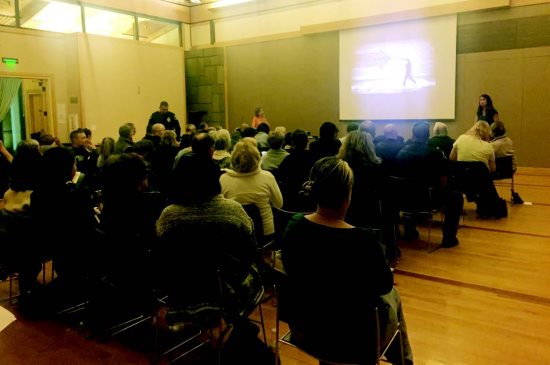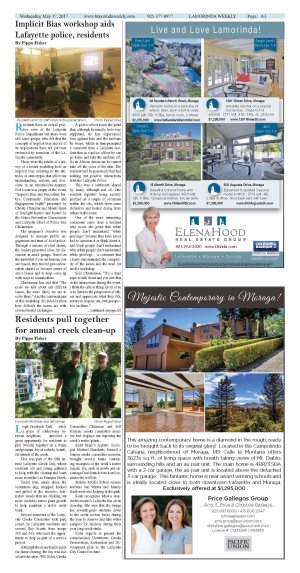| | Published May 17th, 2017
| Implicit Bias workshop aids Lafayette police, residents
| | | By Pippa Fisher |  | | Residents and city staff listen to the presentation. Photo Pippa Fisher |
Residents have an overall positive view of the Lafayette Police Department but there were still some people who felt that the concepts of implicit bias and all of its implications have not yet been embraced by members of the Lafayette community.
 Those were the results of a survey of a recent workshop held on implicit bias, referring to the attitudes or stereotypes that affect our understanding, actions, and decisions in an unconscious manner. Not a seat was empty at the event, "Implicit Bias and Procedural Justice Community Education and Engagement Night" presented by Christy Chandler and Shanti Brien of Daylight Justice and hosted by the Crime Prevention Commission and Lafayette Chief of Police Eric Christensen.
Those were the results of a survey of a recent workshop held on implicit bias, referring to the attitudes or stereotypes that affect our understanding, actions, and decisions in an unconscious manner. Not a seat was empty at the event, "Implicit Bias and Procedural Justice Community Education and Engagement Night" presented by Christy Chandler and Shanti Brien of Daylight Justice and hosted by the Crime Prevention Commission and Lafayette Chief of Police Eric Christensen.
 The program's objective was designed to increase public engagement and trust of local police. Through a serious of slide shows, the leaders presented ideas for discussion in small groups. Based on the tenet that if you are human, you are biased, they tried to get conversation started to become aware of one's biases and to help come up with ways to counter them.
The program's objective was designed to increase public engagement and trust of local police. Through a serious of slide shows, the leaders presented ideas for discussion in small groups. Based on the tenet that if you are human, you are biased, they tried to get conversation started to become aware of one's biases and to help come up with ways to counter them.
 Christensen has said that "The more we talk about our difficult issues, the more likely we are to solve them." And the conversations at this workshop did indeed reflect how difficult the issues are with several heated exchanges.
Christensen has said that "The more we talk about our difficult issues, the more likely we are to solve them." And the conversations at this workshop did indeed reflect how difficult the issues are with several heated exchanges.
 A police officer made the point that, although he usually feels very supported, he has experienced bias against him and the uniform he wears, which in turn prompted a comment from a Lafayette resident that as a police officer he can go home and take the uniform off. As an African American, he cannot take off the color of his skin. The resident said he personally had had nothing but positive interactions with the Lafayette Police.
A police officer made the point that, although he usually feels very supported, he has experienced bias against him and the uniform he wears, which in turn prompted a comment from a Lafayette resident that as a police officer he can go home and take the uniform off. As an African American, he cannot take off the color of his skin. The resident said he personally had had nothing but positive interactions with the Lafayette Police.
 This was a sentiment shared by many, although not all. One resident reported being racially profiled on a couple of occasions within the city, which drew some defensive and heated dialog from others in the room.
This was a sentiment shared by many, although not all. One resident reported being racially profiled on a couple of occasions within the city, which drew some defensive and heated dialog from others in the room.
 One of the more interesting comments came from a resident who made the point that white people don't understand "white privilege" because they have never had to question it or think about it, and black people don't understand why white people don't understand white privilege - a comment that clearly demonstrated the complexity of the issues and the need for such a workshop.
One of the more interesting comments came from a resident who made the point that white people don't understand "white privilege" because they have never had to question it or think about it, and black people don't understand why white people don't understand white privilege - a comment that clearly demonstrated the complexity of the issues and the need for such a workshop.
 Said Christensen, "It's a hard topic to talk about and you saw that in the interactions during the event. I think the critical thing for all of us is to listen to the perspective of others and appreciate what they felt, not try to impose our own perspective on them."
Said Christensen, "It's a hard topic to talk about and you saw that in the interactions during the event. I think the critical thing for all of us is to listen to the perspective of others and appreciate what they felt, not try to impose our own perspective on them."
 Brien said that they expected different views would be expressed and that conversations might get emotional. She said, "These conversations are productive despite being uncomfortable at times because they bring to our awareness issues that we need to confront."
Brien said that they expected different views would be expressed and that conversations might get emotional. She said, "These conversations are productive despite being uncomfortable at times because they bring to our awareness issues that we need to confront."
 "Participants completed surveys, both before and following the presentation. As Chandler later commented, "For the most part our program was very well received with positive feedback."
"Participants completed surveys, both before and following the presentation. As Chandler later commented, "For the most part our program was very well received with positive feedback."
 City Manager Steven Falk said, "I'm just really proud of the progressive work our Police Department and Crime Prevention Commission are doing here. Rather than waiting for something bad to happen, they're trying to prevent it before it does."
City Manager Steven Falk said, "I'm just really proud of the progressive work our Police Department and Crime Prevention Commission are doing here. Rather than waiting for something bad to happen, they're trying to prevent it before it does."
 Christensen said that the city invests in the training of its police officers. The entire police staff recently attended training at the Museum of Tolerance in Los Angeles on race and bias.
Christensen said that the city invests in the training of its police officers. The entire police staff recently attended training at the Museum of Tolerance in Los Angeles on race and bias.
 He is a strong believer in police and community working together at events such as this and also the Citizen's Police Academy, to foster trust and a sense of togetherness.
He is a strong believer in police and community working together at events such as this and also the Citizen's Police Academy, to foster trust and a sense of togetherness.
 Christensen said the event was very successful. "In baseball parlance, the event was a home run. In fact, because of the comments from the audience during the event, the commission is likely to host a second community forum on the topic of racial profiling before the end of the year."
Christensen said the event was very successful. "In baseball parlance, the event was a home run. In fact, because of the comments from the audience during the event, the commission is likely to host a second community forum on the topic of racial profiling before the end of the year."

|
| | | | | | | | | | | | |




